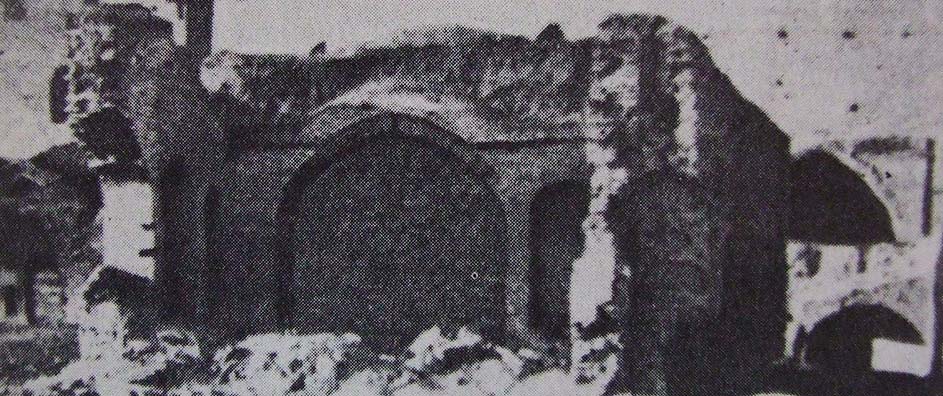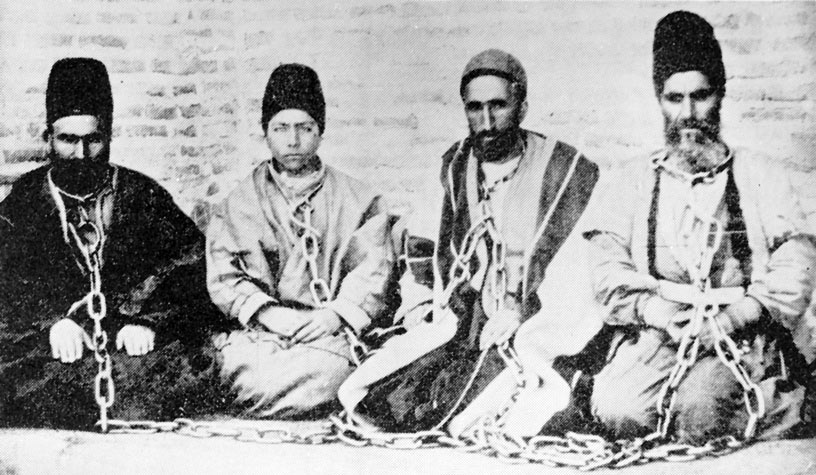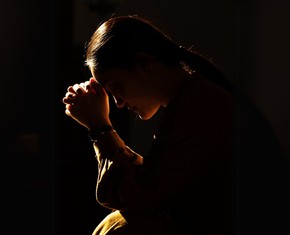The views expressed in our content reflect individual perspectives and do not represent the authoritative views of the Baha'i Faith.
Baha’u’llah was thrown into the Black Pit, an infamous dungeon in Tehran. A number of other Babis had also been arrested and were chained together with him in the dungeon. Baha’u’llah later described this experience:
We were consigned for four months to a place foul beyond comparison. As to the dungeon in which this Wronged One and others similarly wronged were confined, a dark and narrow pit were preferable. Upon Our arrival We were first conducted along a pitch-black corridor, from whence We descended three steep flights of stairs to the place of confinement assigned to Us. The dungeon was wrapped in thick darkness, and Our fellow prisoners numbered nearly a hundred and fifty souls: thieves, assassins and highwaymen.
Though crowded, it had no other outlet than the passage by which We entered. No pen can depict that place, nor any tongue describe its loathsome smell. Most of these men had neither clothes nor bedding to lie on. God alone knoweth what befell Us in that most foul-smelling and gloomy place! – Epistle to the Son of the Wolf, pp. 20-21.
Baha’u’llah was forced to wear constantly one or the other of two heavy chains. So great was their weight that they left him scarred for the rest of his life.
One of the witnesses to the horrible toll these sufferings took on Baha’u’llah was his own son. A boy of only eight years at the time, he was allowed to see his father briefly at the prison. The sight of his father struggling under the weight of the chains was heartrending, and would remain a vivid memory for the remainder of his life.
Baha’u’llah’s immediate family was not exempt from the tide of revenge that swept Tehran and its environs. Overnight His wife and children found themselves destitute, virtually every earthly possession having been taken away by the mob. At one point their deprivation was so severe that Baha’u’llah’s wife, Navvab, could find no other food than dry flour, which she poured into the palms of her children’s hands for them to eat.
Other Babis shared similar sufferings, and hundreds, absolutely innocent of any wrongdoing, were put to death in circumstances of extreme cruelty. Many of the executions were recorded in the government gazette in celebratory terms. The bloodbath inevitably attracted the attention of foreign visitors, virtually all of whom commented with horror on the injustices being perpetrated against the Babis. These observers left many written accounts. One of them was penned by an Austrian officer, Captain von Goumoens, at the time in the employment of the shah. He resigned in disgust over the atrocities being committed against the Babis. The captain wrote these words to a friend, which were later published in several European newspapers:
…But follow me my friend, you who lay claim to a heart and European ethics, follow me to the unhappy ones who, with gouged-out eyes, must eat, on the scene of the deed, without any sauce, their own amputated ears; or whose teeth are torn out with inhuman violence by the hand of the executioner; or whose bare skulls are simply crushed by blows from a hammer; or where the bázár is illuminated with unhappy victims, because on right and left the people dig deep holes in their breasts and shoulders and insert burning wicks in the wounds. I saw some dragged in chains through the bázár, preceded by a military band, in whom these wicks had burned so deep that now the fat flickered convulsively in the wound like a newly-extinguished lamp.
Not seldom it happens that the unwearying ingenuity of the Orientals leads to fresh tortures. They will skin the soles of the Bábís’ feet, soak the wounds in boiling oil, shoe the foot like the hoof of a horse, and compel the victim to run. No cry escaped from the victim’s breast; the torment is endured in dark silence by the numbed sensation of the fanatic; now he must run; the body cannot endure what the soul has endured; he falls. Give him the coup de grâce! Put him out of his pain! No! The executioner swings the whip, and—I myself have had to witness it—the unhappy victim of hundred- fold tortures runs! This is the beginning of the end. As for the end itself, they hang the scorched and perforated bodies by their hands and feet to a tree head-downwards, and now every Persian may try his marksmanship to his heart’s content from a fixed but not too proximate distance on the noble quarry placed at his disposal. I saw corpses torn by nearly 150 bullets.
The more fortunate suffered strangulation, stoning or suffocation: they were bound before the muzzle of a mortar, cut down with swords, or killed with dagger thrusts, or blows from hammers and sticks. Not only the executioner and the common people took part in the massacre: sometimes Justice would present some of the unhappy Bábís to various dignitaries and the Persian[recipient] would be well content, deeming it an honour to imbrue his own hands in the blood of the pinioned and defenceless victim. Infantry, cavalry, artillery, the ghuláms or guards of the King, and the guilds of butchers, bakers, etc., all took their fair share in these bloody deeds…
At present I never leave my house, in order not to meet with fresh scenes of horror. . . . “Since my whole soul revolts against such infamy, against such abominations as recent times, according to the judgement of all, present, I will no longer maintain my connection with the scene of such crimes… ” – quoted in Moojan Momen’s The Babi and Baha’i Religions, 1844-1944, pp. 132-134.

















Comments
Sign in or create an account
Continue with Googleor